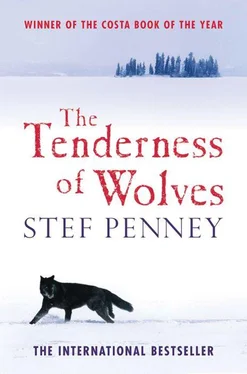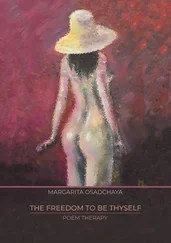To tell the truth he looks, more than anything, alarmed at the sight of me. Perhaps he looks at everyone this way, but it gives the impression he knows slightly more about me than I would like, and thus knows I am not the sort of person he would want his daughters to associate with.
‘Mr Knox … I’m afraid it is not a pleasure. There has been a … a terrible accident.’
Scenting gossip of the richest sort, Mrs Knox comes in a minute later, and I tell them both what is in the cabin by the river. Mrs Knox clutches at the little gold cross at her throat. Knox receives the news calmly, but turns away at one point, and turns back, having, I can’t help feeling, composed his features into a suitable cast–grim, stern, resolute, and so on. Mrs Knox sits beside me stroking my hand while I try not to snatch it away.
‘And to think, the last time I saw him was in the store that time. He looked so …’
I nod in agreement, thinking how we had fallen into a guilty silence on her approach. After many protestations of shocked sympathy and advice for shattered nerves, she rushes off to inform their two daughters in a suitable way (in other words, with far more detail than if their father were present). Knox dispatches a messenger to Fort Edgar to summon some Company men. He leaves me to admire the view, then returns to say he has summoned John Scott (who, in addition to owning the store and flour mill, has several warehouses and a great deal of land) to go with him to examine the cabin and secure it against ‘intrusion’ until the Company representatives arrive. That is the word he uses, and I feel a certain criticism. Not that he can blame me for finding the body, but I am sure he regrets that a mere farmer’s wife has sullied the scene before he has had a chance to exercise his superior faculties. But I sense something else in him too, other than his disapproval–excitement. He sees a chance for himself to shine in a drama far more urgent than most that occur in the backwoods–he is going to investigate. I presume he takes Scott so that it looks official and there is a witness to his genius, and because Scott’s age and wealth give him a sort of status. It can be nothing to do with intelligence–Scott is living proof that the wealthy are not necessarily better or cleverer than the rest of us.
We head upriver in Knox’s trap. Since Jammet’s cabin is close to our house, they cannot avoid my accompanying them, and since we reach his cabin first, I offer to come in with them. Knox wrinkles his brow with avuncular concern.
‘You must be exhausted after your terrible shock. I insist that you go home and rest.’
‘We will be able to see whatever you saw,’ Scott adds. And more, is the implication.
I turn away from Scott–there is no point arguing with some people–and address the hatchet profile. He is affronted, I realise, that my feminine nature can bear the thought of confronting such horror again. But something inside me hardens stubbornly against his assumption that he and only he will draw the right conclusions. Or perhaps it is just that I don’t like being told what to do. I say I can tell them if anything has been disturbed, which they cannot deny, and anyway, short of manhandling me down the track and locking me in my house, there is little they can do.
The autumn weather is being kind, but there is the faint tang of decay when Knox pulls open the door. I didn’t notice it before. Knox steps forward, breathing through his mouth and puts his fingers on Jammet’s hand–I see him hover, wondering where to touch him–before pronouncing him quite cold. The two men speak in low voices, almost whispering. I understand–to speak louder would be rude. Scott takes out a notebook and writes down what Knox says as he observes the position of the body, the temperature of the stove, the arrangement of items in the room. Then Knox stands for a while doing nothing, but still manages to look purposeful–an accident of anatomy I observe with interest. There is a scuff of footprints on the dusty floor, but no strange objects, no weapon of any sort. The only clue is that awful round wound on Jammet’s head. It must have been an Indian outlaw, Knox says. Scott agrees: no white man could do something so barbaric. I picture his wife’s face last winter, when it was swollen black and blue and she claimed she had slipped on a patch of ice, although everybody knew the truth.
The men go upstairs to the other room. I can tell where they go by the creak of their feet pressing on floorboards and the dust that falls between them and catches the light. It trickles onto Jammet’s corpse, falling softly on his cheek, like snowflakes. Little flecks land, unbearably, on his open eyes and I can’t take my gaze off them. I have an urge to go and brush it off, tell them sharply to stop disturbing things, but I don’t do either. I can’t make myself touch him.
‘No one has been up there for days–the dust was quite undisturbed,’ says Knox when they are down again, flicking dirt off their trousers with pocket-handkerchiefs. Knox has brought a clean sheet from upstairs, and he shakes it out, sending more dust motes whirling round the room like a swarm of sunlit bees. He places the sheet over the body on the bed.
‘There, that should keep the flies off,’ he says with an air of self-congratulation, though any fool can see that it will do no such thing.
It is decided that we–or rather they–can do no more, and on leaving, Knox closes and secures the door with a length of wire and a blob of sealing wax. A detail that, though I hate to admit it, impresses me.
When the weather turns cold Andrew Knox is made painfully aware of his age. Every autumn for some years now his joints have started to hurt, and go on hurting all winter no matter how many layers of flannel and wool he wraps them in. He has to walk gingerly, to accommodate the shooting pains in each hip. Each autumn the pains start a little earlier.
But today weariness spreads through his entire soul. He tells himself that it is understandable–a violent event like murder is bound to shake anyone. But it is more than that. No one has been murdered in the history of the two villages. We came here to get away from all that, he thinks: we were supposed to leave that behind when we left the cities. And yet the strangeness of it … a brutal barbarian killing, like something that would happen in the southern States. In the past few years several people have died of old age, of course, of fever or accident, not to mention those poor girls … But no one has been slaughtered, defenceless in their stockinged feet. He is upset by the victim’s shoelessness.
He reads through Scott’s notes after dinner, and tries not to lose his patience: ‘The stove is three feet high and one foot eight inches deep, faintly warm to the touch.’ He supposes this might be useful. Assuming the fire was going strongly at the time of death, it could take thirty-six hours to become cold. So the murder could have happened the day before. Unless the fire had already started to die down when Jammet met his end, in which case it could have happened during the night. But it is not inconceivable that it took place the previous night. In their search today they found little. There were no clear signs of a struggle; no blood other than on the bed, where he must have been attacked. They wondered aloud whether the place had been searched, but his belongings were scattered so haphazardly–their usual state, according to Mrs Ross–that it was impossible to be certain. Scott protested loudly that it must be a native: no white man could do something so barbaric. Knox is less sure. Some years ago Knox was called to a farm near Coppermine, after a particularly regrettable incident. There is a practice popular in some communities whereby a groom is ritually humiliated on his wedding night. It is known as a ‘charivari’ and is meant as a genial show of disapproval at, say, an old man taking a much younger wife. In this case the elderly bridegroom had been tarred and feathered and strung up by his feet from a tree outside his own house, while local youths paraded in masks, banging kettles and blowing whistles.
Читать дальше












